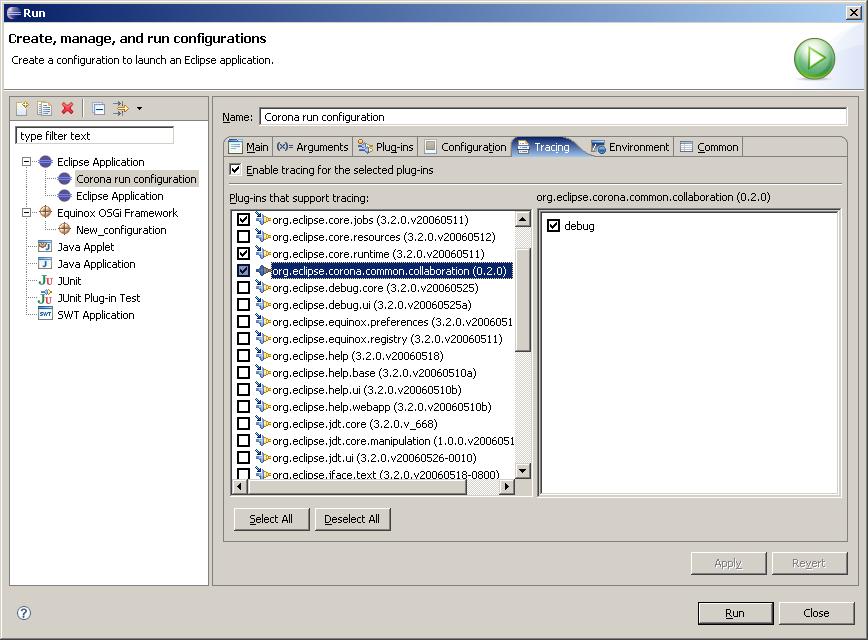Notice: This Wiki is now read only and edits are no longer possible. Please see: https://gitlab.eclipse.org/eclipsefdn/helpdesk/-/wikis/Wiki-shutdown-plan for the plan.
Corona Logging
Contents
OSGi Log Service
Corona Logging uses OSGi Log Service. OSGi specifies two log services:
- Log Service - allows bundles to log information including a message, a level, an exception, a ServiceReference object, and a Bundle object
- Log Reader Service - allows bundles to access a list of LogEntry objects, and allows the registration of a LogListener object that receives LogEntry objects as they are created.
To extend control over log statements log4j package is used. It is plugged into Corona through the LogListener object registered with the use of the OSGi Log Reader Service.
For details on OSGi services see: OSGi Service Platform, Service Compendium, Release4, August 2005.
Required Bundles
Bundles/classes/libraries required by Corona Logging:
- bundle: org.eclipse.corona.logger.log4j
- class: org.eclipse.corona.logger.log4j.listeners.Log4jListener -> log listener converting OSGi log events to log4j logs
- class: org.eclipse.corona.logger.log4j.Log4jBundleActivator -> bundle activator responsible for log4j listener initialization and registration within OSGi Log Reader Service
- log4j.properties -> configuration of log4j loggers, appenders, layouts etc.used by Corona
- bundle: org.apache.log4j_1.2.13
- library: log4j-1.2.13.jar -> log4j package
- class: org.eclipse.corona.logger.log4j.appenders.EclipseLogAppender -> log4j appender responsible for sending logs to eclipse platform (when eclipse application is run/debug, eclipse platform registers a listener responsible for sending logs events to Error Log view), class not required by Corona Logging
- bundle: org.eclipse.corona.tools
- class: org.eclipse.corona.log.CoronaLogService -> Log Service wrapper responsible for:
- retrieval of LogService reference
- retrieval of DebugOptions service reference - service responsible for loading debug tracking options defined with the use of .options file. For detailed information see: [Eclipse Debug Options chapter]
- enabling LogService API
- class: org.eclipse.corona.log.CoronaLogService -> Log Service wrapper responsible for:
CoronaLogService wrapper is to be used by any Corona bundle activator. See: [Sample Bundle Activator using CoronaLogService].
- bundle: org.eclipse.equinox.log
Implementation of OSGi Log Service and Log Reader Service.
Corona Logging Configuration
To assure that OSGi Log Service and Log Reader Service is registered and available:
- modify config.ini (located inside: ${eclipse_home}/configuration) by adding to osgi.bundles the following: org.eclipse.osgi.services@2:start, org.eclipse.equinox.log@3:start, org.eclipse.corona.logger.log4j@4:start
- start/restart eclipse workbench.
To define loggers and appenders for Corona:
- modify log4j.properties located inside org.eclipse.corona.logger.log4j bundle
- restart org.eclipse.corona.logger.log4j bundle.
To load debug tracking options:
- start eclipse workbench with the command line argument -debug [.options file path].
If no .options file path is specified, expected location is ${eclipse_home}/.options. Command line argument -debug is equivalent to setting osgi.debug inside config.ini.
To add/remove/modify bundles that are to be run in a debug mode:
- modify .options file indicated by -debug option
- start/restart eclipse workbench.
For details on debug tracking options see: Eclipse Debug Options.
Eclipse Debug Options
Using -debug option (or equivalently setting osgi.debug property inside config.ini) allows for starting any eclipse application in a debug mode. The value of -debug option is treated as the location of .options file. If there is no file path defined after -debug, expected location of .options file is ${eclipse_home}/.options.
.options file content:
<bundle_name>/debug=true|false e.g. org.eclipse.corona.common.collaboration/debug=true
When -debug option is specified and .options file is found, DebugOptions service is registered and available. This service is responsible for loading debug tracking options from .options file. Calling eclipse -debug [.options_path] will start eclipse platform and use [.options_path] for locating and loading debug tracking options (one .options file is used).
For development .options can be added to any created plugin/bundle root directory. Such bundles' .options are used by the Tracing tab of the eclipse Run/Debug dialog. The Tracing tab allows for specification of the list of bundles with debug tracking enabled.

